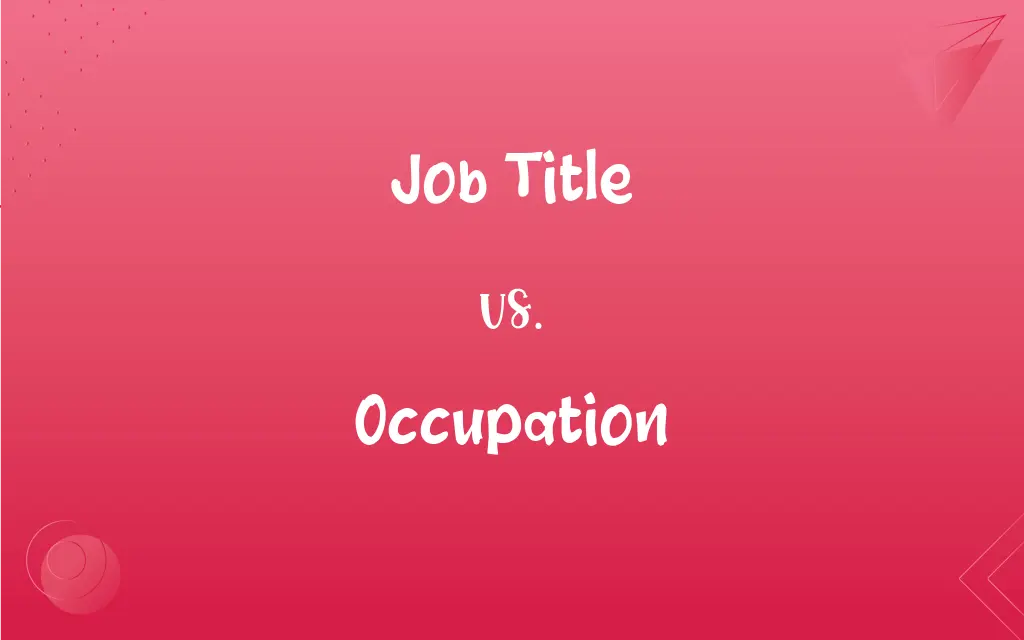Job Title vs. Occupation: What's the Difference?
Edited by Janet White || By Harlon Moss || Updated on October 9, 2023
A job title specifies a particular role or position within an organization, whereas occupation refers to a broader vocation or career field.

Key Differences
Job title refers to the specific name of a position held within a company or organization. This title typically defines the role and level within the organizational structure, providing a precise indication of a person’s responsibilities and status within a workplace. Job titles are often used in professional contexts, such as on business cards, email signatures, and resumes, serving to quickly communicate one's role and expertise to others.
Occupation, conversely, encompasses a broader range of roles and refers to a general field of employment. It does not specify rank, seniority, or specific duties but instead denotes the general nature of work that a person is engaged in. Occupations are often categorized in terms of industries or sectors, such as healthcare, finance, or education, allowing for a wider spectrum of roles within that domain.
A job title is usually unique and specific to the organizational context. For instance, a "Marketing Manager" explicitly outlines the department (marketing) and the level of responsibility (managerial). Job titles are crucial in delineating the hierarchical structure within an entity and facilitating clear role-related communication among employees.
Occupation takes a more generalized approach in describing one’s employment, allowing for the inclusion of various job titles under one umbrella term. For example, “engineer” is an occupation, which can encompass numerous job titles like "Civil Engineer," "Mechanical Engineer," or "Electrical Engineer." Occupations provide a generalized idea about a person's skillset and area of expertise without delving into specific organizational roles or ranks.
Comparison Chart
Specificity
Highly specific to role and organization.
General field or category of work.
ADVERTISEMENT
Indication of Rank
Often indicates rank or level.
Does not indicate rank or level.
Usage
Used in professional and formal contexts.
Used to broadly describe work category.
Example
Marketing Manager, Software Developer.
Marketing, Engineering.
Role Description
Detailed and role-specific.
Broad and category-specific.
Job Title and Occupation Definitions
Job Title
Job titles may suggest the employment sector and organizational function.
“Health and Safety Officer” is a job title that signals a role in workplace well-being.
ADVERTISEMENT
Occupation
An occupation refers to a general field of work or profession.
His occupation in medicine involves a focus on surgical procedures.
Job Title
A job title denotes a specific role within an organization.
His job title, Chief Financial Officer, reflects his high-ranking position.
Occupation
Occupations can be described without indicating a level of seniority.
She has been in the teaching occupation for a decade.
Job Title
Job titles often suggest the level of hierarchy and responsibility.
The job title “Senior Developer” implies a higher rank than “Junior Developer.”
Occupation
Occupations often align with industry sectors.
Many in the tech occupation are currently exploring remote work options.
Job Title
Job titles can indicate specialization in a certain field or department.
Her job title, “Graphic Designer,” reveals her area of expertise.
Occupation
Occupations categorize work without specifying organizational roles.
Despite their different job titles, they all work in the finance occupation.
Job Title
Job titles are often used in professional networking and communication.
She introduced herself with her job title, “Sales Coordinator,” at the conference.
Occupation
Occupations can encompass a range of related job titles.
The occupation of engineering includes electrical, civil, and mechanical fields.
FAQs
How specific is a job title?
A job title is very specific, often indicating role, department, and rank within an organization.
Can a job title indicate seniority?
Yes, job titles often include terms that suggest rank, such as “senior” or “manager.”
What does occupation refer to?
Occupation refers to a broad field or category of work, without specifying role or rank.
Can one occupation encompass multiple job titles?
Yes, an occupation can include various job titles, like “engineer” including “Mechanical Engineer” and “Civil Engineer.”
Can a job title include department information?
Yes, job titles often specify department, like “Marketing Coordinator” or “HR Specialist.”
Is occupation linked to industry sectors?
Yes, occupation generally refers to work within specific industry sectors like finance or healthcare.
Should job title be included on a resume?
Yes, including your job title on a resume provides clarity about your role and expertise.
Is occupation relevant when considering career paths?
Yes, considering occupations allows exploring varied roles within a particular field of work.
Can occupation provide insight into industry trends?
Often, yes. Trends within an occupation can reflect larger shifts or developments within an industry sector.
Can occupation indicate a person's skillset?
Yes, occupation provides a general idea about a person’s skillset and expertise area.
Can several job titles exist within one occupation?
Absolutely, several job titles with varying responsibilities might exist within a single occupation.
Do job titles matter in networking?
Job titles can matter, offering a quick snapshot of your role and expertise to others in networking contexts.
Does occupation detail specific duties?
No, occupation generally doesn’t detail specific duties or organizational role.
Do job titles convey professionalism?
Often, yes. Job titles can convey expertise and position, showcasing professional standing.
Should I negotiate job title during a job offer?
It can be beneficial to negotiate job title if it impacts future opportunities and perception.
Are job titles standardized across industries?
Not always. Job titles can vary between organizations and sectors, and might not always be directly comparable.
Does the same job title ensure similar responsibilities across companies?
Not necessarily, since job titles and their associated responsibilities can vary between organizations.
Can a job title change with promotion?
Yes, promotions often come with a change in job title to reflect new responsibilities.
Are occupations always associated with paid work?
No, occupations can refer to any general field of work, whether paid, unpaid, or voluntary.
Are occupations typically broad in nature?
Yes, occupations refer to broad categories of work, like teaching or engineering, without detailing specific roles.
About Author
Written by
Harlon MossHarlon is a seasoned quality moderator and accomplished content writer for Difference Wiki. An alumnus of the prestigious University of California, he earned his degree in Computer Science. Leveraging his academic background, Harlon brings a meticulous and informed perspective to his work, ensuring content accuracy and excellence.
Edited by
Janet WhiteJanet White has been an esteemed writer and blogger for Difference Wiki. Holding a Master's degree in Science and Medical Journalism from the prestigious Boston University, she has consistently demonstrated her expertise and passion for her field. When she's not immersed in her work, Janet relishes her time exercising, delving into a good book, and cherishing moments with friends and family.
































































